Business Research: Outsourcing Advantages and Disadvantages
VerifiedAdded on 2020/03/16
|5
|1578
|105
Report
AI Summary
This report presents a comprehensive analysis of business outsourcing, focusing on its advantages and disadvantages. It begins by defining outsourcing and exploring its evolution from offshore international sourcing to a strategic tool for business growth. The report delves into the research methodologies employed, including primary and secondary data collection from sources like peer-reviewed journals and IBM. While acknowledging limitations in reliability, the analysis highlights the benefits of outsourcing, such as cost reduction, risk sharing, and focus on core activities. It also examines the drawbacks, including potential reductions in efficiency, hidden costs, and security threats. The report concludes by emphasizing the need for careful implementation and the importance of selecting reputable outsourcing partners to mitigate risks and maximize the benefits for business entities.
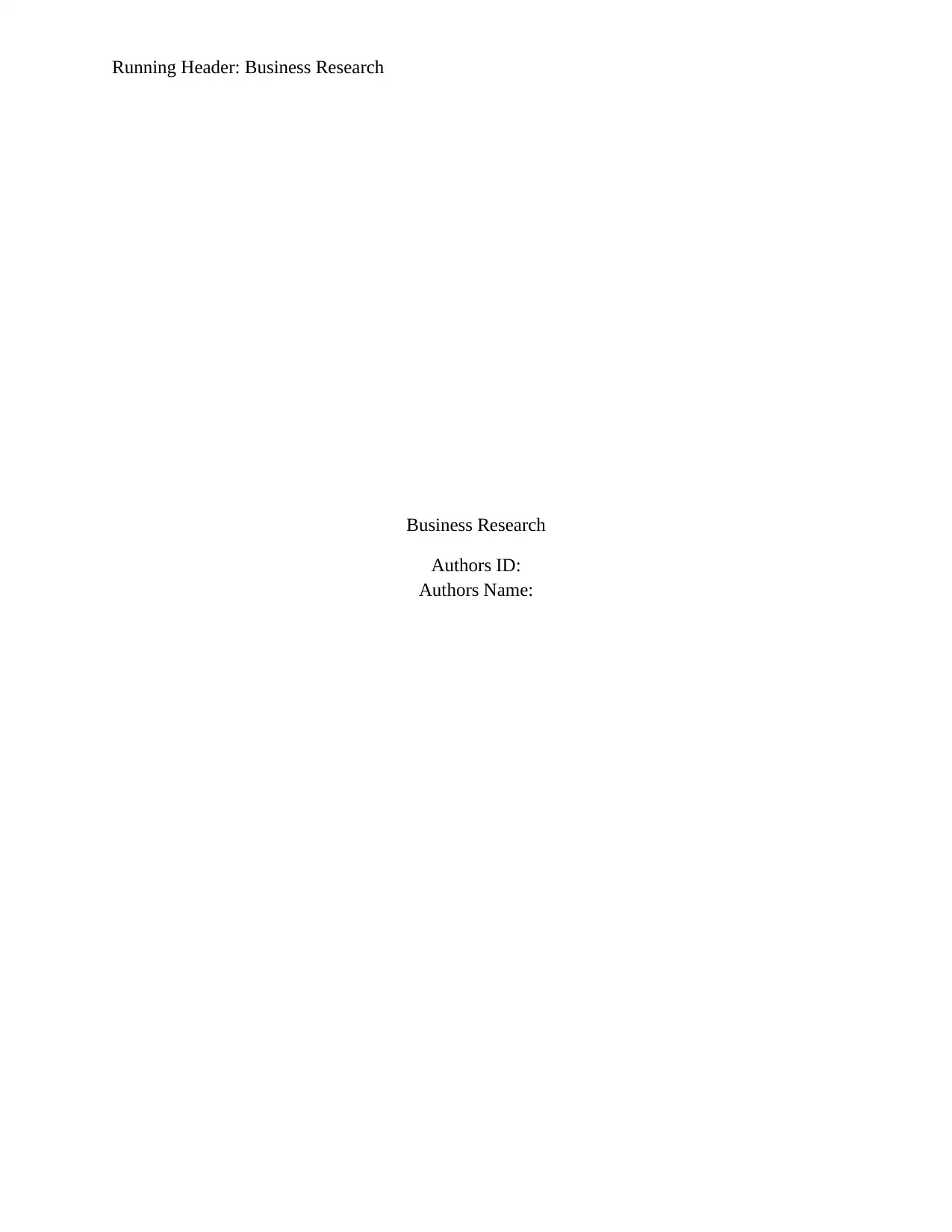
Running Header: Business Research
Business Research
Authors ID:
Authors Name:
Business Research
Authors ID:
Authors Name:
Paraphrase This Document
Need a fresh take? Get an instant paraphrase of this document with our AI Paraphraser
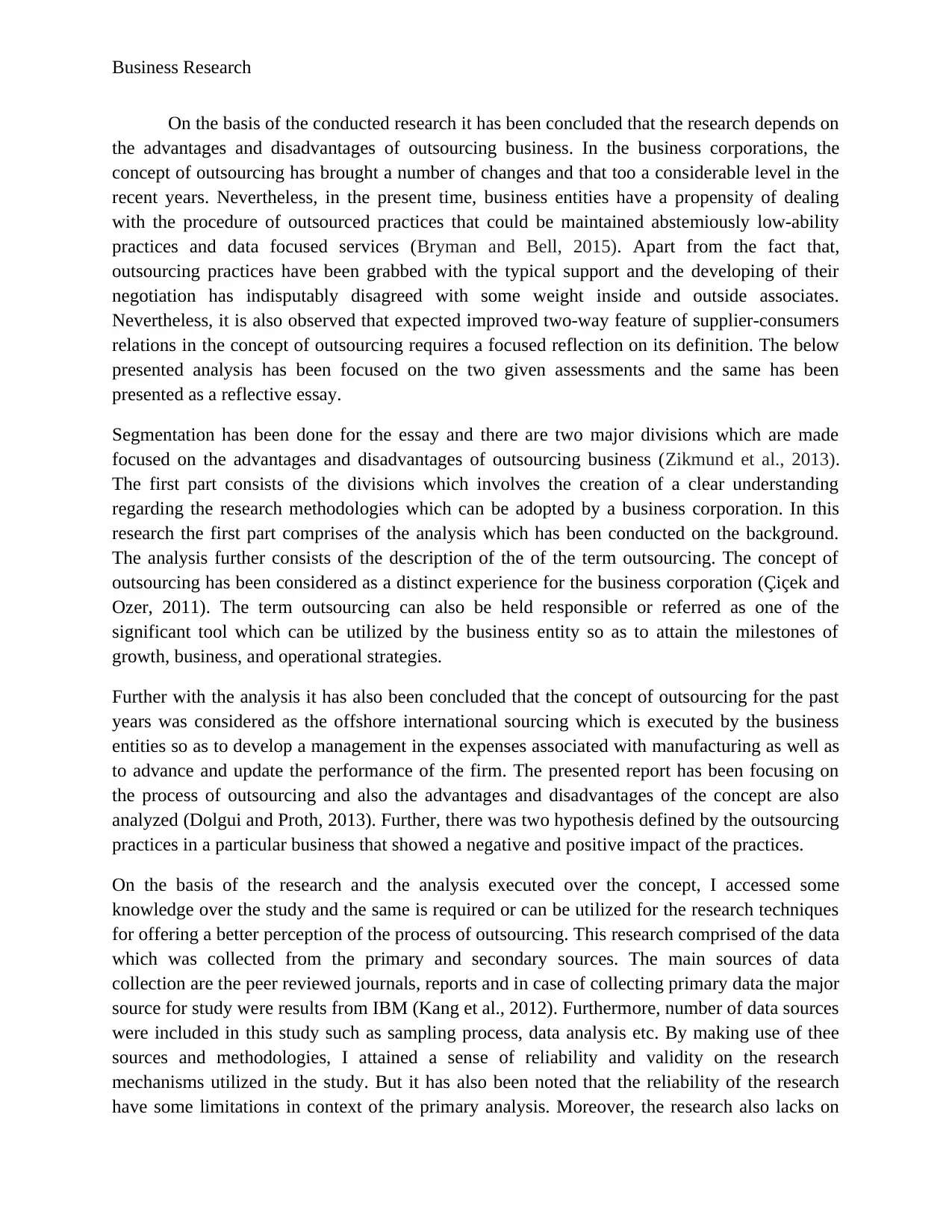
Business Research
On the basis of the conducted research it has been concluded that the research depends on
the advantages and disadvantages of outsourcing business. In the business corporations, the
concept of outsourcing has brought a number of changes and that too a considerable level in the
recent years. Nevertheless, in the present time, business entities have a propensity of dealing
with the procedure of outsourced practices that could be maintained abstemiously low-ability
practices and data focused services (Bryman and Bell, 2015). Apart from the fact that,
outsourcing practices have been grabbed with the typical support and the developing of their
negotiation has indisputably disagreed with some weight inside and outside associates.
Nevertheless, it is also observed that expected improved two-way feature of supplier-consumers
relations in the concept of outsourcing requires a focused reflection on its definition. The below
presented analysis has been focused on the two given assessments and the same has been
presented as a reflective essay.
Segmentation has been done for the essay and there are two major divisions which are made
focused on the advantages and disadvantages of outsourcing business (Zikmund et al., 2013).
The first part consists of the divisions which involves the creation of a clear understanding
regarding the research methodologies which can be adopted by a business corporation. In this
research the first part comprises of the analysis which has been conducted on the background.
The analysis further consists of the description of the of the term outsourcing. The concept of
outsourcing has been considered as a distinct experience for the business corporation (Çiçek and
Ozer, 2011). The term outsourcing can also be held responsible or referred as one of the
significant tool which can be utilized by the business entity so as to attain the milestones of
growth, business, and operational strategies.
Further with the analysis it has also been concluded that the concept of outsourcing for the past
years was considered as the offshore international sourcing which is executed by the business
entities so as to develop a management in the expenses associated with manufacturing as well as
to advance and update the performance of the firm. The presented report has been focusing on
the process of outsourcing and also the advantages and disadvantages of the concept are also
analyzed (Dolgui and Proth, 2013). Further, there was two hypothesis defined by the outsourcing
practices in a particular business that showed a negative and positive impact of the practices.
On the basis of the research and the analysis executed over the concept, I accessed some
knowledge over the study and the same is required or can be utilized for the research techniques
for offering a better perception of the process of outsourcing. This research comprised of the data
which was collected from the primary and secondary sources. The main sources of data
collection are the peer reviewed journals, reports and in case of collecting primary data the major
source for study were results from IBM (Kang et al., 2012). Furthermore, number of data sources
were included in this study such as sampling process, data analysis etc. By making use of thee
sources and methodologies, I attained a sense of reliability and validity on the research
mechanisms utilized in the study. But it has also been noted that the reliability of the research
have some limitations in context of the primary analysis. Moreover, the research also lacks on
On the basis of the conducted research it has been concluded that the research depends on
the advantages and disadvantages of outsourcing business. In the business corporations, the
concept of outsourcing has brought a number of changes and that too a considerable level in the
recent years. Nevertheless, in the present time, business entities have a propensity of dealing
with the procedure of outsourced practices that could be maintained abstemiously low-ability
practices and data focused services (Bryman and Bell, 2015). Apart from the fact that,
outsourcing practices have been grabbed with the typical support and the developing of their
negotiation has indisputably disagreed with some weight inside and outside associates.
Nevertheless, it is also observed that expected improved two-way feature of supplier-consumers
relations in the concept of outsourcing requires a focused reflection on its definition. The below
presented analysis has been focused on the two given assessments and the same has been
presented as a reflective essay.
Segmentation has been done for the essay and there are two major divisions which are made
focused on the advantages and disadvantages of outsourcing business (Zikmund et al., 2013).
The first part consists of the divisions which involves the creation of a clear understanding
regarding the research methodologies which can be adopted by a business corporation. In this
research the first part comprises of the analysis which has been conducted on the background.
The analysis further consists of the description of the of the term outsourcing. The concept of
outsourcing has been considered as a distinct experience for the business corporation (Çiçek and
Ozer, 2011). The term outsourcing can also be held responsible or referred as one of the
significant tool which can be utilized by the business entity so as to attain the milestones of
growth, business, and operational strategies.
Further with the analysis it has also been concluded that the concept of outsourcing for the past
years was considered as the offshore international sourcing which is executed by the business
entities so as to develop a management in the expenses associated with manufacturing as well as
to advance and update the performance of the firm. The presented report has been focusing on
the process of outsourcing and also the advantages and disadvantages of the concept are also
analyzed (Dolgui and Proth, 2013). Further, there was two hypothesis defined by the outsourcing
practices in a particular business that showed a negative and positive impact of the practices.
On the basis of the research and the analysis executed over the concept, I accessed some
knowledge over the study and the same is required or can be utilized for the research techniques
for offering a better perception of the process of outsourcing. This research comprised of the data
which was collected from the primary and secondary sources. The main sources of data
collection are the peer reviewed journals, reports and in case of collecting primary data the major
source for study were results from IBM (Kang et al., 2012). Furthermore, number of data sources
were included in this study such as sampling process, data analysis etc. By making use of thee
sources and methodologies, I attained a sense of reliability and validity on the research
mechanisms utilized in the study. But it has also been noted that the reliability of the research
have some limitations in context of the primary analysis. Moreover, the research also lacks on
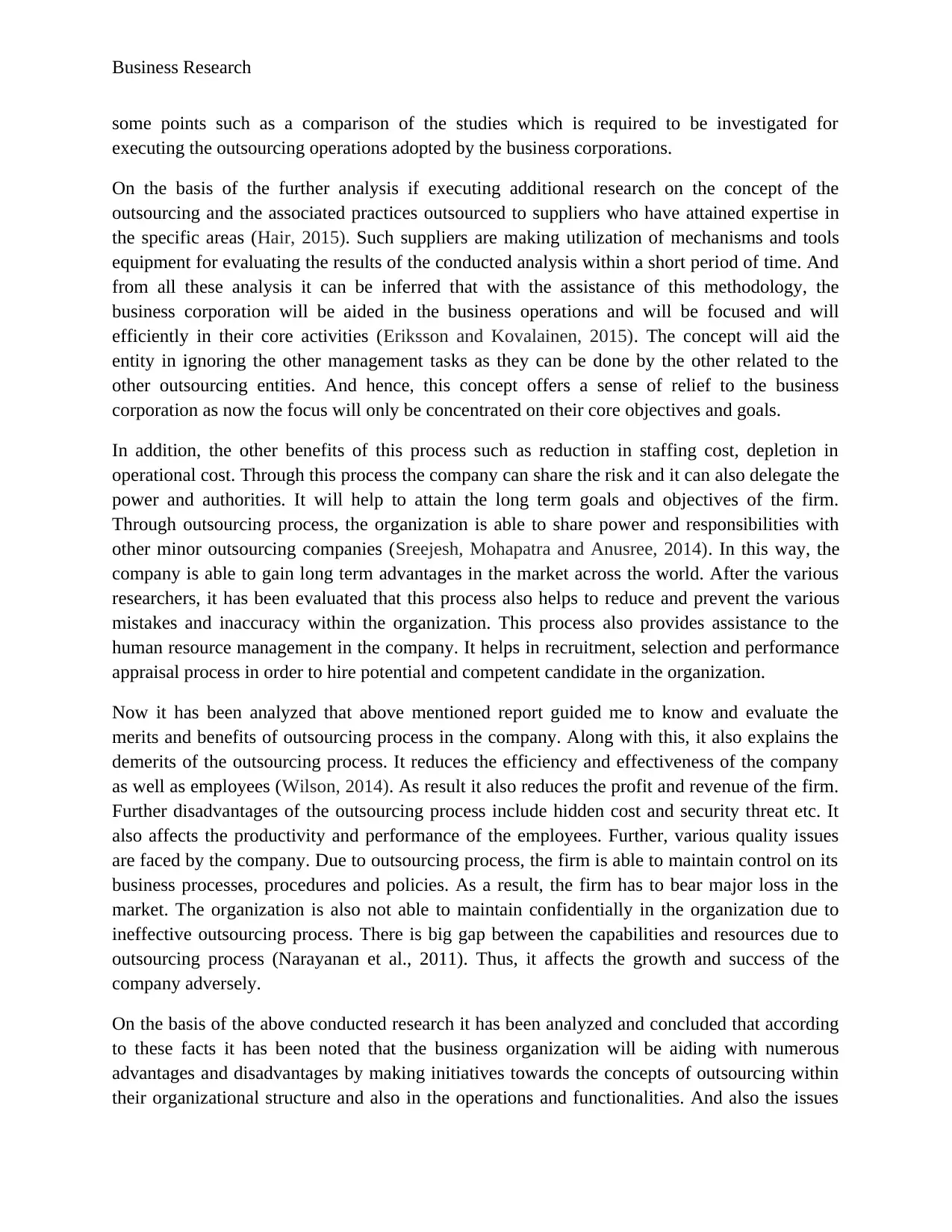
Business Research
some points such as a comparison of the studies which is required to be investigated for
executing the outsourcing operations adopted by the business corporations.
On the basis of the further analysis if executing additional research on the concept of the
outsourcing and the associated practices outsourced to suppliers who have attained expertise in
the specific areas (Hair, 2015). Such suppliers are making utilization of mechanisms and tools
equipment for evaluating the results of the conducted analysis within a short period of time. And
from all these analysis it can be inferred that with the assistance of this methodology, the
business corporation will be aided in the business operations and will be focused and will
efficiently in their core activities (Eriksson and Kovalainen, 2015). The concept will aid the
entity in ignoring the other management tasks as they can be done by the other related to the
other outsourcing entities. And hence, this concept offers a sense of relief to the business
corporation as now the focus will only be concentrated on their core objectives and goals.
In addition, the other benefits of this process such as reduction in staffing cost, depletion in
operational cost. Through this process the company can share the risk and it can also delegate the
power and authorities. It will help to attain the long term goals and objectives of the firm.
Through outsourcing process, the organization is able to share power and responsibilities with
other minor outsourcing companies (Sreejesh, Mohapatra and Anusree, 2014). In this way, the
company is able to gain long term advantages in the market across the world. After the various
researchers, it has been evaluated that this process also helps to reduce and prevent the various
mistakes and inaccuracy within the organization. This process also provides assistance to the
human resource management in the company. It helps in recruitment, selection and performance
appraisal process in order to hire potential and competent candidate in the organization.
Now it has been analyzed that above mentioned report guided me to know and evaluate the
merits and benefits of outsourcing process in the company. Along with this, it also explains the
demerits of the outsourcing process. It reduces the efficiency and effectiveness of the company
as well as employees (Wilson, 2014). As result it also reduces the profit and revenue of the firm.
Further disadvantages of the outsourcing process include hidden cost and security threat etc. It
also affects the productivity and performance of the employees. Further, various quality issues
are faced by the company. Due to outsourcing process, the firm is able to maintain control on its
business processes, procedures and policies. As a result, the firm has to bear major loss in the
market. The organization is also not able to maintain confidentially in the organization due to
ineffective outsourcing process. There is big gap between the capabilities and resources due to
outsourcing process (Narayanan et al., 2011). Thus, it affects the growth and success of the
company adversely.
On the basis of the above conducted research it has been analyzed and concluded that according
to these facts it has been noted that the business organization will be aiding with numerous
advantages and disadvantages by making initiatives towards the concepts of outsourcing within
their organizational structure and also in the operations and functionalities. And also the issues
some points such as a comparison of the studies which is required to be investigated for
executing the outsourcing operations adopted by the business corporations.
On the basis of the further analysis if executing additional research on the concept of the
outsourcing and the associated practices outsourced to suppliers who have attained expertise in
the specific areas (Hair, 2015). Such suppliers are making utilization of mechanisms and tools
equipment for evaluating the results of the conducted analysis within a short period of time. And
from all these analysis it can be inferred that with the assistance of this methodology, the
business corporation will be aided in the business operations and will be focused and will
efficiently in their core activities (Eriksson and Kovalainen, 2015). The concept will aid the
entity in ignoring the other management tasks as they can be done by the other related to the
other outsourcing entities. And hence, this concept offers a sense of relief to the business
corporation as now the focus will only be concentrated on their core objectives and goals.
In addition, the other benefits of this process such as reduction in staffing cost, depletion in
operational cost. Through this process the company can share the risk and it can also delegate the
power and authorities. It will help to attain the long term goals and objectives of the firm.
Through outsourcing process, the organization is able to share power and responsibilities with
other minor outsourcing companies (Sreejesh, Mohapatra and Anusree, 2014). In this way, the
company is able to gain long term advantages in the market across the world. After the various
researchers, it has been evaluated that this process also helps to reduce and prevent the various
mistakes and inaccuracy within the organization. This process also provides assistance to the
human resource management in the company. It helps in recruitment, selection and performance
appraisal process in order to hire potential and competent candidate in the organization.
Now it has been analyzed that above mentioned report guided me to know and evaluate the
merits and benefits of outsourcing process in the company. Along with this, it also explains the
demerits of the outsourcing process. It reduces the efficiency and effectiveness of the company
as well as employees (Wilson, 2014). As result it also reduces the profit and revenue of the firm.
Further disadvantages of the outsourcing process include hidden cost and security threat etc. It
also affects the productivity and performance of the employees. Further, various quality issues
are faced by the company. Due to outsourcing process, the firm is able to maintain control on its
business processes, procedures and policies. As a result, the firm has to bear major loss in the
market. The organization is also not able to maintain confidentially in the organization due to
ineffective outsourcing process. There is big gap between the capabilities and resources due to
outsourcing process (Narayanan et al., 2011). Thus, it affects the growth and success of the
company adversely.
On the basis of the above conducted research it has been analyzed and concluded that according
to these facts it has been noted that the business organization will be aiding with numerous
advantages and disadvantages by making initiatives towards the concepts of outsourcing within
their organizational structure and also in the operations and functionalities. And also the issues
⊘ This is a preview!⊘
Do you want full access?
Subscribe today to unlock all pages.

Trusted by 1+ million students worldwide
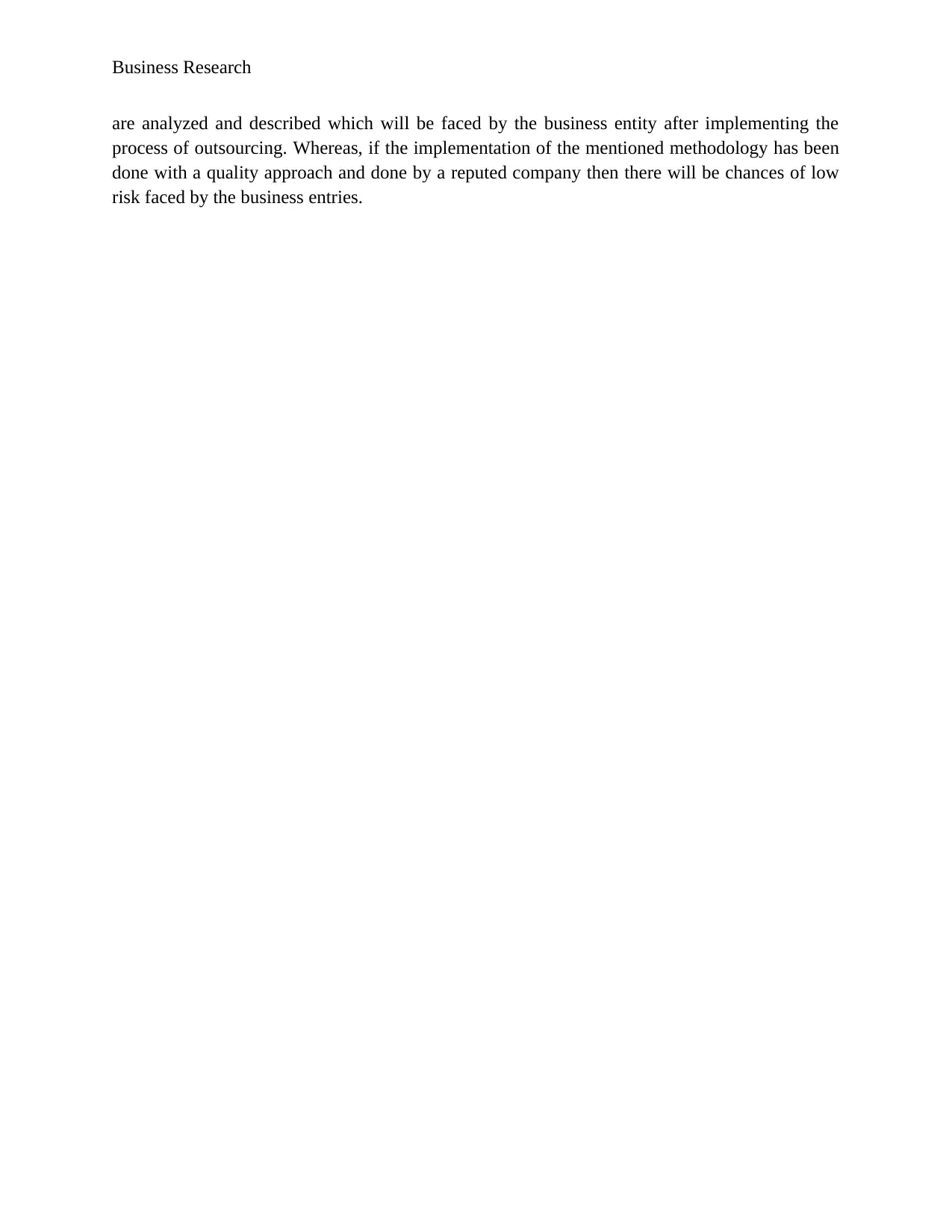
Business Research
are analyzed and described which will be faced by the business entity after implementing the
process of outsourcing. Whereas, if the implementation of the mentioned methodology has been
done with a quality approach and done by a reputed company then there will be chances of low
risk faced by the business entries.
are analyzed and described which will be faced by the business entity after implementing the
process of outsourcing. Whereas, if the implementation of the mentioned methodology has been
done with a quality approach and done by a reputed company then there will be chances of low
risk faced by the business entries.
Paraphrase This Document
Need a fresh take? Get an instant paraphrase of this document with our AI Paraphraser
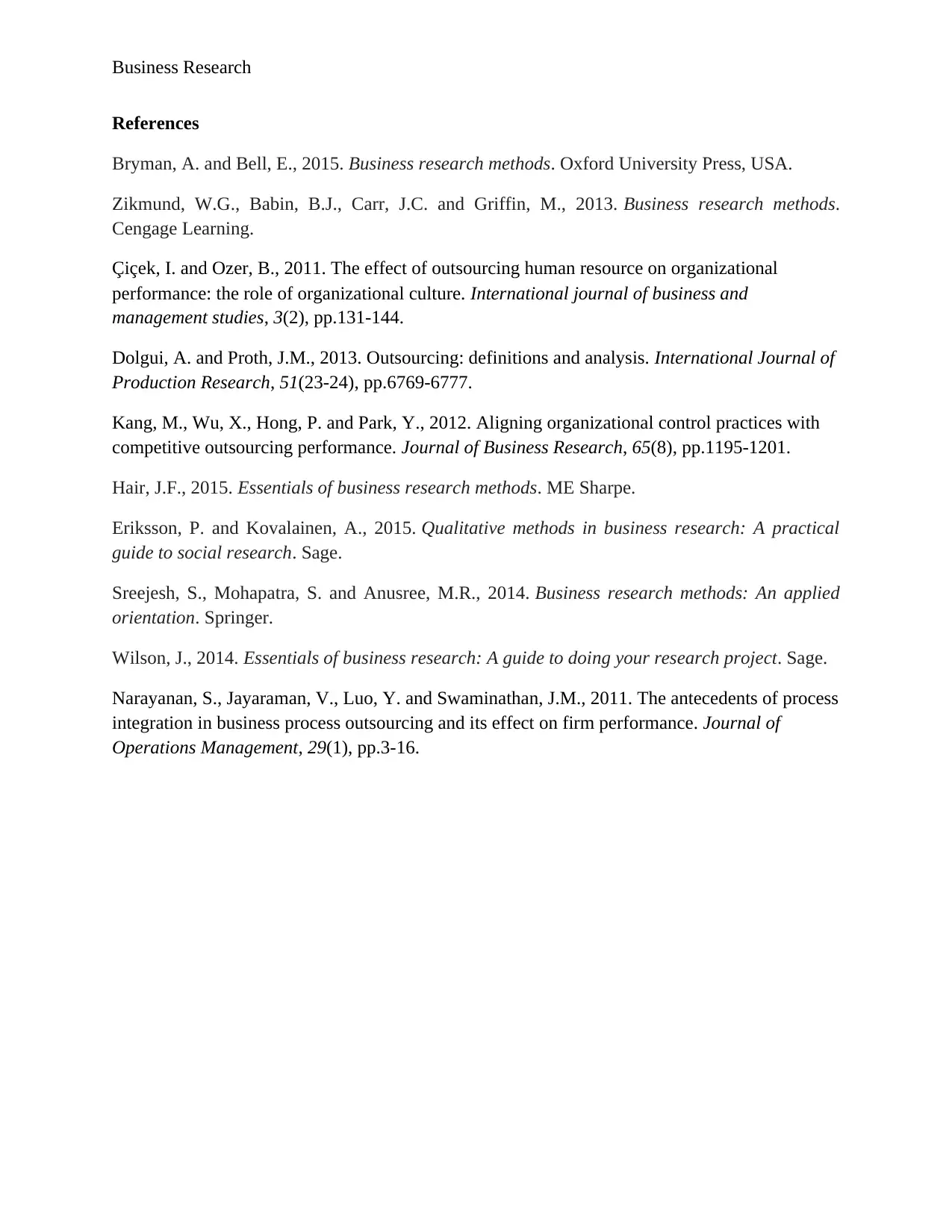
Business Research
References
Bryman, A. and Bell, E., 2015. Business research methods. Oxford University Press, USA.
Zikmund, W.G., Babin, B.J., Carr, J.C. and Griffin, M., 2013. Business research methods.
Cengage Learning.
Çiçek, I. and Ozer, B., 2011. The effect of outsourcing human resource on organizational
performance: the role of organizational culture. International journal of business and
management studies, 3(2), pp.131-144.
Dolgui, A. and Proth, J.M., 2013. Outsourcing: definitions and analysis. International Journal of
Production Research, 51(23-24), pp.6769-6777.
Kang, M., Wu, X., Hong, P. and Park, Y., 2012. Aligning organizational control practices with
competitive outsourcing performance. Journal of Business Research, 65(8), pp.1195-1201.
Hair, J.F., 2015. Essentials of business research methods. ME Sharpe.
Eriksson, P. and Kovalainen, A., 2015. Qualitative methods in business research: A practical
guide to social research. Sage.
Sreejesh, S., Mohapatra, S. and Anusree, M.R., 2014. Business research methods: An applied
orientation. Springer.
Wilson, J., 2014. Essentials of business research: A guide to doing your research project. Sage.
Narayanan, S., Jayaraman, V., Luo, Y. and Swaminathan, J.M., 2011. The antecedents of process
integration in business process outsourcing and its effect on firm performance. Journal of
Operations Management, 29(1), pp.3-16.
References
Bryman, A. and Bell, E., 2015. Business research methods. Oxford University Press, USA.
Zikmund, W.G., Babin, B.J., Carr, J.C. and Griffin, M., 2013. Business research methods.
Cengage Learning.
Çiçek, I. and Ozer, B., 2011. The effect of outsourcing human resource on organizational
performance: the role of organizational culture. International journal of business and
management studies, 3(2), pp.131-144.
Dolgui, A. and Proth, J.M., 2013. Outsourcing: definitions and analysis. International Journal of
Production Research, 51(23-24), pp.6769-6777.
Kang, M., Wu, X., Hong, P. and Park, Y., 2012. Aligning organizational control practices with
competitive outsourcing performance. Journal of Business Research, 65(8), pp.1195-1201.
Hair, J.F., 2015. Essentials of business research methods. ME Sharpe.
Eriksson, P. and Kovalainen, A., 2015. Qualitative methods in business research: A practical
guide to social research. Sage.
Sreejesh, S., Mohapatra, S. and Anusree, M.R., 2014. Business research methods: An applied
orientation. Springer.
Wilson, J., 2014. Essentials of business research: A guide to doing your research project. Sage.
Narayanan, S., Jayaraman, V., Luo, Y. and Swaminathan, J.M., 2011. The antecedents of process
integration in business process outsourcing and its effect on firm performance. Journal of
Operations Management, 29(1), pp.3-16.
1 out of 5
Related Documents
Your All-in-One AI-Powered Toolkit for Academic Success.
+13062052269
info@desklib.com
Available 24*7 on WhatsApp / Email
![[object Object]](/_next/static/media/star-bottom.7253800d.svg)
Unlock your academic potential
Copyright © 2020–2026 A2Z Services. All Rights Reserved. Developed and managed by ZUCOL.




